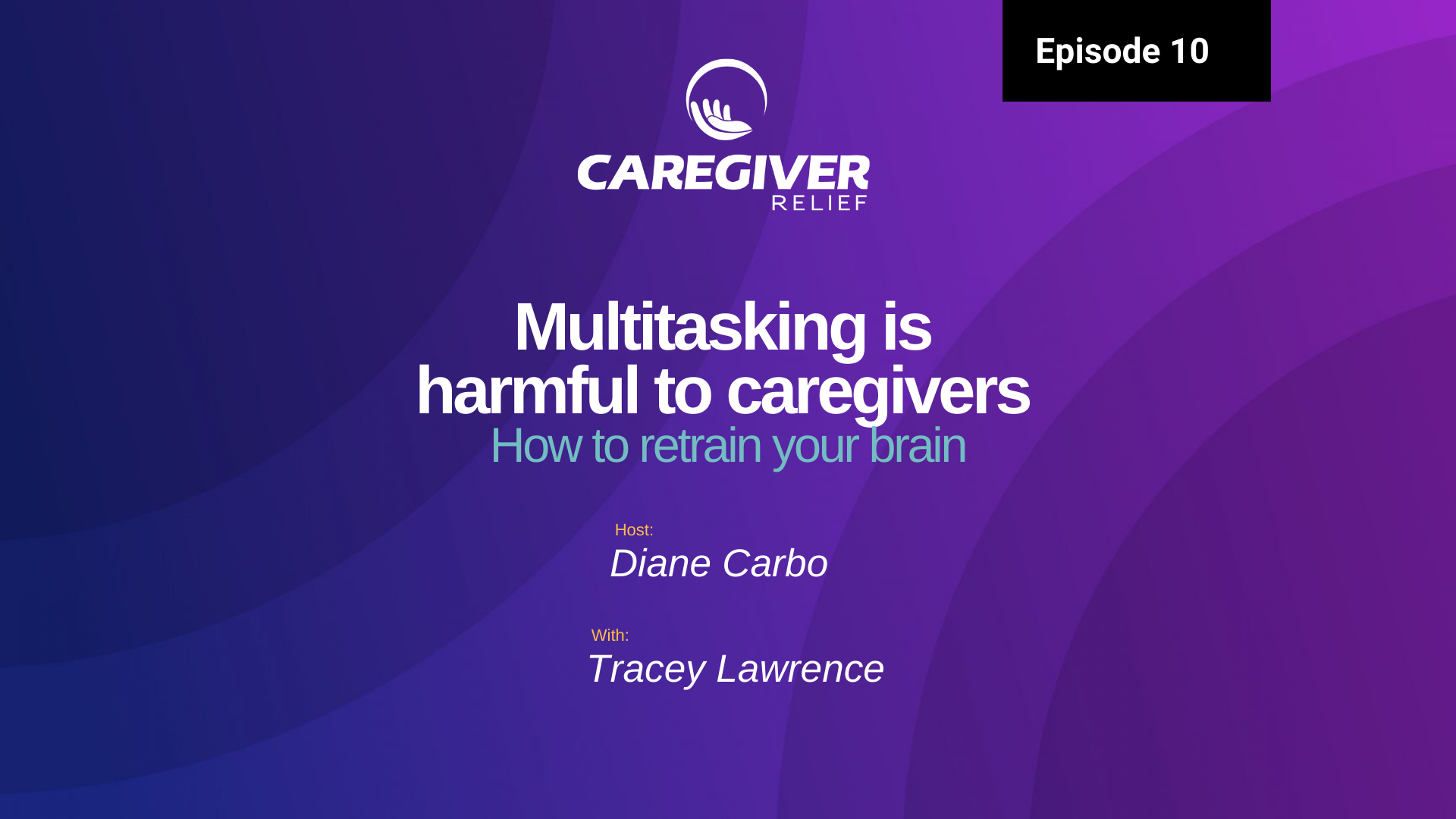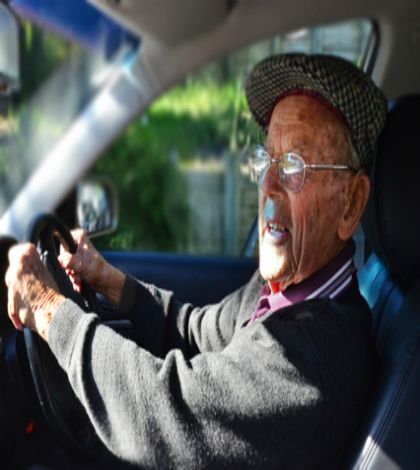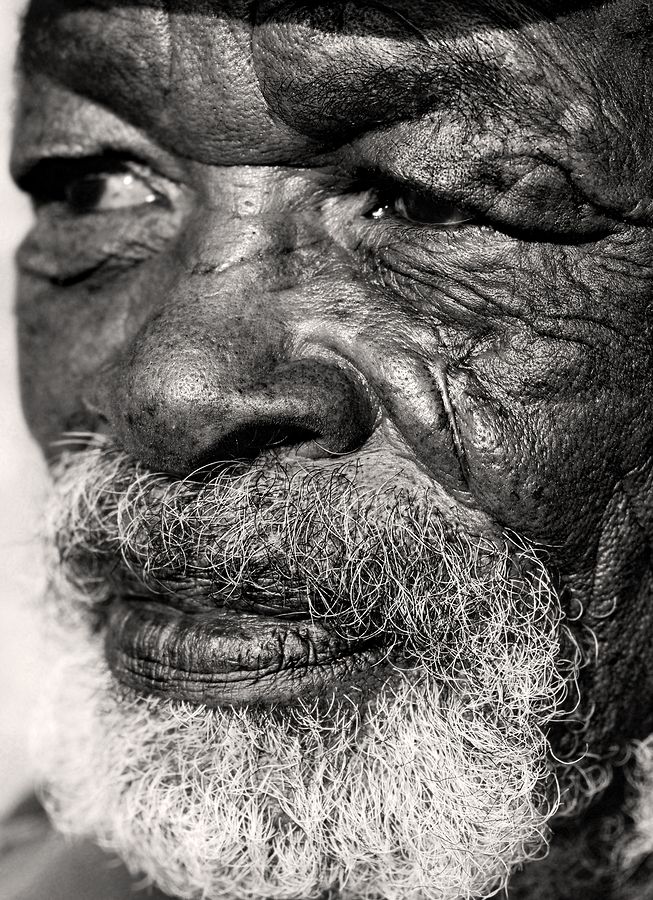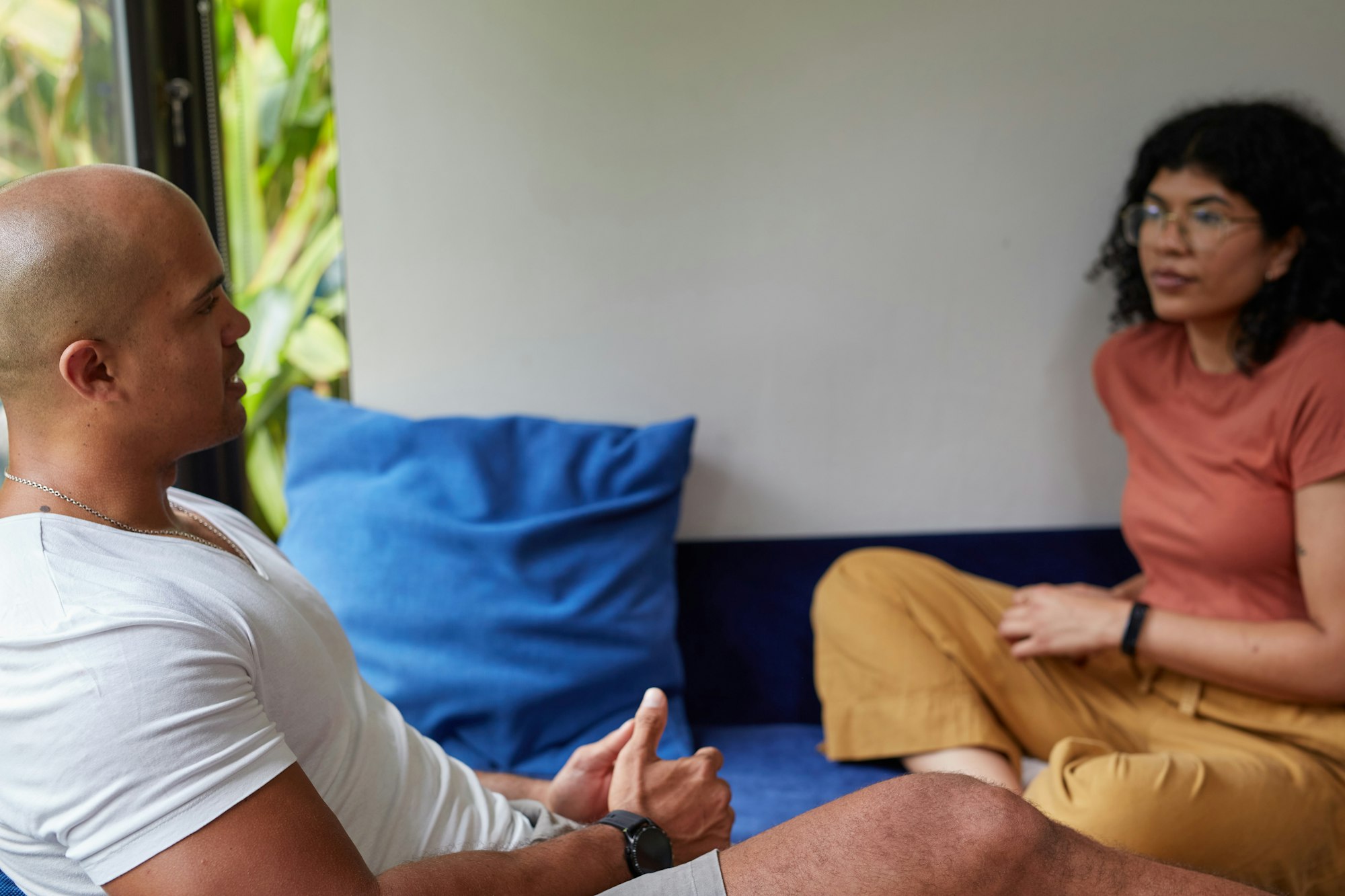The Impact of Multitasking on Caregivers' Well-being with Tracey S Lawrence - Episode 10

In the fast-paced world of today, multitasking has become a common practice, often hailed as a way to increase productivity. However, for caregivers like Rhonda Long, who are responsible for the care of their aging family members, multitasking can have detrimental effects on their well-being. This article delves into Rhonda's story and explores how multitasking, once considered a productivity booster, can negatively affect the physical and mental health of caregivers.
Diane Carbo: Hi, this is Diane carbo with caregiver relief. And today I have with me Tracy S Lawrence she’s a caregiver coach, a podcast contributor for us. Tracy is the founder of grand family planning, LLC, and the author of the groundbreaking book dementia sucks. Tracy, I’m excited to have you here today and I’m loving our topic. Do you want to introduce the topic to a listener?
Tracey Lawrence: Oh, absolutely. And as always I’m thrilled to be back., I had this idea for a topic during the week and it’s one of my favorites, multitasking and it’s particularly important when you’re a a caregiver in our society, we are sold. Idea that we are capable of doing multiple things at the same time. And I have learned over time that it’s a myth. I don’t care how smart you are, how challenged you are what your IQ is personally. I’ve found that I do my best work when I’m focused on one thing at a time. How about you?
Diane Carbo: Absolutely. In fact, I looked up the word multitasking because I wanted to tell our listeners what multitasking was and it was very funny because the, what I learned was the word wasn’t around until 1965 . I thought that was very interesting and Albert Einstein is given credit to a quote that I came across and he says, I fear the day that technology will surpass human interaction, the world will have a generation of idiots and there is no doubt in my mind that technology is changing our brains and the experts are agreeing and it’s not for the better. So when people are multitasking, let’s talk about this because caregivers, this is my thought process on it. Caregivers are the unpaid. The biggest group of healthcare workers in the country. They don’t know it. They don’t get acknowledged for it, but that responsibility is placed on them. By society by our poor insurance coverage with things. So what I’ve learned is 90% of our home care is done by the unpaid family caregivers.
Tracey Lawrence: Yes. I seen, I’ve seen very similar data and I think you and I like we look at different things, but there’s a lot, there is overlap, but we both know in our hearts, but that’s true. We know we meet these people. They and they share with us and they. We’re comfortable sharing with us because we understand them. One of the things that I try to do is to let people know it’s okay to say, I can’t do this, or no, no is actually a complete sentence. And it’s one that using, we, we feel this incredible obligation. Not to let anybody down. And the one person we’re okay with letting down is ourselves. And we feel like it, it’s okay to let ourselves down because we’ll make it up later. I’ll get myself something, oh, I’ll get myself a treat or, I’ll go get an ice cream or something. But it’s not enough. , we have to stop telling her these lies because they’re damaging. Okay. When we’re trying to manage all these things, to keep all these balls in the air, and we’re the one bowl that we’re being allowed to try. That we’re allowing to drop is the one that, represents what’s important to us time off some kind of respite, some kind of so some place in our lives where we can just do something exclusively for our own wellbeing. And we don’t do that. We don’t, we, or we certainly don’t do enough of it.
Diane Carbo: You’re absolutely correct. And one of the things that was being studied right now by a psychologist is the limits of the human ability to process more than one set of stimuli at a time, which I find fascinating because the unpaid family caregiver is balancing. A lot of them, the sandwich generation kids work , their own household, their own family, the family member, the aging family members and multitasking is. Something that people think that they need to able to do to stay competitive, at least in the workforce and to connect as they connect with friends and family. And it’s really frightening out there because now developing a new form of anxiety. And I didn’t know what this was, but I looked it up. M O which is fear of missing out fear of missing out. Okay. So multitasking is trying to stay on top of things. Cut while you’re at work or at home with your kids, doing stuff at home or whatever. And you’re trying to use technology to send emails or texts or do research on for community resources or just to call the doctor, talk about your family loved ones. And while you’re waiting on hold with music for forever in your ear, you forget what you’re doing because you’re on the computer doing something. And I have been guilty of that.
Tracey Lawrence: Yeah. Oh yeah. And I think, yeah first of all, one thing that I wanted to say is that, we have these devices and they’re supposed to be labor saving, but what they are instead is a friend of mine coined this phrase a long time ago. Satan’s tether because we are forever connected to everything and by having these devices in our lives, We are giving others license to intrude on us. There were times when we were younger when people would never call you because they felt like it was too late. Or, I know that this is the time of day when they’re, putting their feet up or watching their favorite TV show or whatever it was. Now, because we have this ability to message someone at any time. We’ll message somebody, anytime we feel like it and think, oh if they don’t answer us now they’ll get back to us eventually. But what happens with a lot of people is they hear that ping. They hear that bell, they hear that noise that says, someone wants to. And then they’ll get up , or, they’ll pick up their device and see who it is that is wanting of their attention at that moment. And so what was meant to be a labor saving device or sold to us as a labor saving device is now something that interferes in our consciousness constantly if we allow it. And for those of us who were in the caregiving space, we have this tendency to keep those devices close at hand because someone in our lives may need us. And so we want to be an earshot of those pings and those noises and those signals so that if somebody really truly needs us, they can get home.
Diane Carbo: Exactly and in doing so , we’re doing everything badly. We can’t concentrate on two things at once. A perfect example of this is how many people are walking and texting or driving and texting, and have accidents or fall, or get hit by a car because they have done more than one thing.
Tracey Lawrence: Yes. Oh yeah. It’s a big problem. And I’ll be, it’d be on the road now and now that they’ve, they’ve stopped messaging us that we need to mask up now they’re saying things like it can wait. The text can wait and we’ve actually created rest areas specifically for texting.
Diane Carbo: Exactly. Multitasking has created a detriment to our own brain health and function.
Tracey Lawrence: Totally agree. Totally agree. Yesterday I I went to a alive party a a gal who who runs in assisted living facility beautiful place and Connecticut they’re finally starting to have some events and yesterday was absolutely gorgeous. And, she had invited me to this event. Yeah. The facility is a good hour and a half from me, but I wanted to support her. And it was also a gorgeous day. And the idea of having, a cocktail and some more d’oeuvres in a beautiful setting was very appealing.
So I drove out. I had a lovely time. I met with some professionals and got to hear a wonderful band play. And as I’m on my I’m getting into my car, I see that my husband is texting. And I took a glance at it and he said, she said did you make it there? Okay. And I texted back saying, yes, I did.
And in fact, I’m on my way home now. And I start up the car and I get on the road and he sends me another text. Now I will not pick up a text while I’m driving. I just simply will not. And I’m like, I hope he’s smart enough to realize that I’m not going to answer it. And sure enough, he calls me. So I was able to speak to him hands free and have a verbal conversation.
And I said, thank you for doing that because I did want to know what you had to say. And he wanted to know if I wanted it. If I was up for having dinner with him, And, far be it for me to turn down the date with my favorite guy. So yeah, absolutely. Yeah. I was glad and he’s yeah, I remembered that you were, you had the car with the hands-free, so yeah.
And it was like, yeah good call. We were able to coordinate, it’s all of these things, we really need to be respectful. Of what our capabilities are and to take that whole idea of multitasking and throw it in the trash. This is coming from someone who’s surrounded by computers.
Okay. Full disclosure, I’m a geek. I still do graphic arts stuff and I do a lot of different things. But that being said, I will set up my computer. To do some tasks for me, something that you know is not necessarily time sensitive, so I can go into something else. Now, technically that might be multitasking because I’ve got a task going, but I am allocating this task to a machine.
The machine is meant to be able to multitask and that’s a good thing, but we should never mistake. , that idea for trying to force our brains to do more or focus on more than one important thing at a time.
Diane Carbo: Exactly. In fact, people believe that they can get more done in less time in a more productive multitasking when it’s been proven over and over again, if you follow the science that the exact opposite is true.
Tracey Lawrence: Yes. Yes. Because it, with whatever you’re doing both tasks suffer. Yeah. The one thing like, come out. Okay. The chances are, if you’re trying to do a couple of things at the same time you’re not going to succeed. And it’s really important to focus. Yeah.
Diane Carbo: In fact, here’s the statistics that I read. I wrote this down experts estimate that switching from task can cause a 40% loss in productivity, and, I can tell you, this is what I experienced after an interruption. You can take up to 30 minutes to get back into your flow where you were before the interruption I experienced that I always have, and I’m 68 years old now, and it’s even harder for me now. . I filled multitask tasks, but not mentally multitask. If I’m doing, I got the washer on, the dishwasher on or the washer washing machine on, and I’m cooking dinner. As I’m talking on the phone, I have to set a timer. To remind me, because Lord knows I’ll be either leaving the clothes in the washer to mildew and stink and have to wash them again or I’m going to burn what’s on the stove because I’ve been distracted and that’s what happens to all of us.
Tracey Lawrence: I’m so guilty of that. Yeah, but we actually we laugh about it now, but a couple of weeks ago, my husband was very upset with me. I like, I put a lot of milk in my coffee and so I warm up the milk in a sauce pan on the stove and then put it , in my coffee cup, which is stainless steel. , that’s not something I’m going to be like microwaving it’s. . I’ll put the pan on the stove with the milk in it and put a flame under it, and then I’ll put her around and, go back, check on it. And six, my coffee. I’ll have a brilliant idea. And I go into, my husband will ask me a question and then we’ll start talking. And then is it the whole idea of the milk goes completely out of my head. Then and an hour later my husband came, he like trace and he showed me the pants. Oh my God, I’m so sorry. Now. He’s I worry about you. I’m like you’re justifiably. But now that I’m, he’s made me aware of this. I’m not going to leave that milk unattended anymore.
Diane Carbo: Going between tasks actually takes a toll on cognitive performance and is actually mentally exhausting. It reduces the attention span. It decreases a person’s ability to learn. And then you have a lowered mental. And one thing that surprised me that I didn’t realize is that also disrupts short-term memory, you lose the capacity to retain important pieces of information for short periods of time. So I, multitasking is that, and that brings me to a point that people need to understand is That people that are caring for someone and they’re doing multitasking, , there is an increase rate and they’re finding this more and more now are developing dementia earlier than ever before
Tracey Lawrence: yep. And a lot of cases, when you’re taking care of someone who has dementia, that’s a lot of stress to put on your butt to put on yourself. And oh, and I also, I wanted to throw it. So though, with regard to attention span the internet has made us all extremely impatient. And I think that w we have to take note that this whole business of instant gratification of being able to find things quickly has not served us as a culture. Years ago I was a graphic artist, I’m still a graphic artist, but what I started in the field, it was all about prints and over time as the internet became more more acceptable. And for those, for kids who were born after, the internet was fully formed you’ll have a hard time thinking of this and you’ll think of me as a dinosaur, but. Okay. I am, I’m a happy guy.
But I got to witness this transition where we went from a world that, where everything was print to a world where everything was read online I started to developing websites and trying to understand how to create graphics and Online viewable items that would download quickly.
And the internet used to be a much slower place by the way. They used to say that in order to make your website viable, everything has to be accessible within seven seconds. And in the age of broadband where everyone is familiar with the internet, to some extent. And using websites, that increments is actually shrunk. It’s gotten shorter. So it makes for shorter attention spans and it makes us less patient people. That can be very dangerous, not just for our brain power, but in our relationships with others.
Diane Carbo: You know what you’re absolutely right, because it makes us less able to learn less able to concentrate and another thing. And we’re seeing this with social media so much less able to be nice to people. So multitasking actually negatively impacts emotional intelligence and makes us less creative, which I found was very interesting. Cause I’ve tried to avoid, I work on my website at work on these podcasts and stuff, but I try to To stay awake, try not to multitask. And one of the things I’ve learned is multitasking, actually hinders your ability to problem solve and think creatively making you less likely to come up with good solutions. And I think that is fascinating to me.
Tracey Lawrence: Yeah. I think our brains were designed. As these filters, because we even, going back millennia where the world was much simpler and we didn’t have as many distractions and able to function and interact and communicate with others. We had to be able to filter out all these other elements that were impinging. And I think that, evolutionarily that’s a characteristic we as humans still have,, in order to have a quality interaction, it’s really gone to be one-to-one. And we really need to be able to slow down and have a conversation with one person at a time, focus on one task at a time. While it may seem like a very large burden to put on ourselves to have to prioritize and do only one thing at a time in the end, it makes you more efficient because you’re wasting less time, half ass things.
Diane Carbo: Exactly. One of the things that I found in my reading last night was people that do a lot of multitasking. Again, it’s going to be the family caregiver, the female caregiver on the unpaid family caregiver. They have they’ve done MRIs and CT scans and they found less brain density in the area of the brain responsible for empathy and emotional control.
Tracey Lawrence: Wow.
Diane Carbo: And I thought that was very fascinating because it makes them having had more difficulty organizing their thoughts and filtering out the irrelevant information and it makes them slower at switching gears.
Tracey Lawrence: That makes so much sense. And it’s amazing that we live in a time when the things that we feel intuitively can be proven with technology. And it’s important for people to pay attention to this stuff. A lot of the devices and the tools that we, utilize can work against. If we try to use them in the wrong way now, I think maybe we could talk a little bit about, good uses of the tools. For instance we had a little discussion before about using calendars and reminders and, for me, whenever anybody asks me, What’s your schedule okay, let me look at my calendar because if I don’t I can’t tell you what every single day of my life is different. And I do, I have different things going on every day, but because I have these calendars, which are enable to use on my various devices, all my computers on my phone, it enables me to prioritize. And be on time for the things that I want to be on time for so that I don’t let people down, but it also keeps you from multitasking because there’s, I’m only, if I see something on my calendar, I’m not going to double.
Diane Carbo: Exactly. I wrote a report 10 years ago. It was caregiver’s attitude and approaches are critical delaying cognitive decline and how you’re caring to make a difference. One of the things that I’ve learned about multitasking and some research studies that are done that practicing mindfulness based stress reduction techniques while providing care for your family member can benefit you both mentally, and cognitively. So it’s being in the here and now. And I thought that was a very fascinating study that was done. Because family caregivers must feel like drawn and quartered every single day. The multitasking is causing serious anxiety, stress, depression, and they need to learn too.
Number one, take a step back out from life, tick off the crazy world that we’re in, of being competitive or being on top or in touch with everybody every second of every day. And try to practice mindfulness-based stress reduction. It’s important to avoid burnout and major medical conditions that your body’s going to have because your body is meant to protect you from the threats that come your way and in the beginning, you start to feel like there’s tigers and bears chasing you after a while with the lifestyle that we’re having. And we’re not free from that stress. Every. So a tiny part of our brain, the hypothalamus starts a chemical and nerve response in motion. It said to her, your adrenal grant glands and which are located right above the kidneys and it releases cortisol and adrenaline, and that causes an increase in your heart rate and your blood pressure and your energy
cortisol is known as the stress hormone, and it increases blood sugars in your body. It puts us in a fight or flight mode. That’s why we have so many caregivers that are under constant stress are actually having a decrease in their body’s immune system. It affects their digestive system and it affects their thought process and motivation levels.
Multitask is a perfect example of what we go through as caregivers and what we need to do to change so that we can take care of ourselves.
Tracey Lawrence: Absolutely. Are you talking about things like meditation?
Diane Carbo: Yes. Yes. Mindful meditation. Yes. Or actually just a mindful approach. If you’re caring for somebody in mid to stages to late stages of dementia, they are living mindfully because they can’t remember what just happened from one moment to the next . So they’re living in the moment and we, as individuals need to learn to live in the moment. Our levels of stress hormones, it will just make our lives better. Another technique is just mindful breathing. I find, I know with me, I suffer from chronic pain that my concentration levels and my ability to learn has dramatically changed. So I am, I’m forcing myself not to multitask, to focus on one thing at a time.
Tracey Lawrence: That’s good. That’s great. The reason isn’t great, but yeah, it’s great that you have this this ability to to take control of the situation and as an aside, I actually, I read a book. I don’t know if I shared this with you, but there there’s a book that I read called why Buddha never got Alzheimer’s.
Diane Carbo: Tell me more...
Tracey Lawrence: And doctor who who had clients who were experiencing cognitive decline had she embarked on on therapy that included meditation and yoga and as a doctor and a clinician, he was able to manage. Where they were at and he found that over time, they could actually reverse cognitive decline with those with those activities. Yeah. It’s really interesting. And, for people who are in that situation where you’re starting to experience Cognition that’s clearly not as good as what it once was. Maybe That it’s time for you to start. Re-evaluating what you’re doing and your daily activities, and learn about meditation. Learn about yoga because these are therapies. That number one, they can’t hurt you.
Diane Carbo: Exactly.
Tracey Lawrence: I don’t need any special equipment. You don’t need any medications. Generally, for yoga only, you need a sticky mat. And for meditation, you really don’t need anything, but a quiet spot to sit in. And there were a lot of great free resources out there to help you to learn about these techniques. I even wrote about it in my book. Yoga was so important to me. Especially when I was taking care of my mom. It was such an important break for me. , physically, spiritually, emotionally it’s just, to me it’s just it’s a brilliant thing to do for yourself. And you don’t have to do it for a long time. You can just take 10 minutes out of your day and do some simple. Moves that can really just brighten your outlook for hours.
Diane Carbo: I will agree to that because I am one that I go to the beach. I’m here in Myrtle beach and I just get my Zen moment. Whether I’m walking on the beach, getting touch in touch with nature and just thinking positive thoughts. I will tell you another thing that I learned that I find that we’ll see, that will support everything we’ve been saying is multitasking is contributing to premature aging. To premature brain aging at a cellular level. I think that one of the things about multitasking, especially with our computers right now is we are seeing for the first time ever a decrease in our life span. Since the fifties our license has increased , three months for every year and for the first time ever. And it has nothing to do with COVID. This was starting to happen before that, it has to do with our lifestyles and not using our brains the way they were. And we’re also seeing a very, a big increase in early onset.
Tracey Lawrence: Yeah that’s a tragedy that that we can avert, but to your point, we have to become more mindful in the way we live our lives. We need to, give ourselves downtime. We also need to exercise. And we can be creative about how we do those things. The combination and here’s where you can multitask, you can walk down the, to the beach and appreciate nature. That’s the kind of multitasking we should be doing more of.
Diane Carbo: Exactly. And they say that you need to find a task and concentrate on it and remove any temptations for distractions and set a timer for 25 minutes so that you have a hundred percent of your attention at that time. Don’t check your emails, answer your phone, surf the net, or allow yourself to be distracted in any way, shape or form. Turn the cell phone off. You can do it for 25 minutes. They’re saying that just those 25 minutes, you’ll get so much work done with these short bursts, but you have to make it. And that’s what I find for me is I get in. If I’m not on the beach walking. I tried to get in a pool every day for my pain, but for my mental status I always say I’m going to go step off the world for awhile. That’s what I do. I do. I actually step up the world and I walk away from everything. I turn everything off the TV, the radio, whatever, and I do it. I’m actually doing it for an hour every day, because at my age, I need. But, you have to start to rewire your brain, to block out distractions and increase your focus for extended periods of time. That’s what I work on. I didn’t know it at the time, what I’ve been doing is just because I needed to do this for me to make me feel better, because it really bothers me that I have a hard time concentrating and focusing on things. And I have to reread things several times. Some of it has to do with brain fog due to pain. But it’s on the other distractions were just too much.
Tracey Lawrence: I’m so glad that you’re taking good care of yourself, Diane, you certainly deserve it.
Diane Carbo: And that we all deserve it. In, mindfulness meditation, it’s just a simple form of meditation. It just trains your brain to increase your awareness of the moment. And when you’re doing that you’re reducing your stress and you’re improving your ability to focus and concentrate.
Tracey Lawrence: Absolutely.
Diane Carbo: That’s awesome. And on that note, I’m going to say that I’m so excited. We talked about this and I hope that our caregivers out there are going to pay attention to this and understand that we’re out there to help them.
And caregivers, I’m going to tell you right now, you are the most important part of the caregiving equation without you. It all falls apart. Be gentle with yourself. Practice yoga or meditation every day, because you’re worth it. Tracey, thank you so much again. And I’m so excited that we have this opportunity to speak and help our other caregivers out there.
Tracey Lawrence: Same here, Diane and everyone take brilliant care of yourselves. You absolutely do that.
Diane Carbo: And I can’t wait till next week to see what we’re going to talk about.
Rhonda's Struggle:
Rhonda Long, a dedicated caregiver, exemplifies the challenges faced by many caregivers. Her story sheds light on the complex issues that arise when taking care of aging parents. Rhonda and her parents, who are not eligible for Medicaid, grapple with financial constraints while providing necessary care. As her parents face various health issues, Rhonda's responsibilities increase, leading to her personal struggles with stress and burnout.
The Myth of Productivity:
While society often praises multitasking as a way to accomplish more in less time, research shows that it does not necessarily lead to improved efficiency. In fact, attempting to juggle multiple tasks can result in a 40% loss of productivity. This loss can stem from the brain's reduced ability to focus, leading to decreased attention span and impaired cognitive function. This phenomenon is particularly relevant for caregivers who must manage various caregiving responsibilities alongside their daily tasks.
Negative Effects on Caregivers:
Multitasking takes a toll on caregivers' mental and emotional well-being. The constant switching between tasks can contribute to increased stress, anxiety, and depression. Additionally, the increased production of stress hormones like cortisol affects the body's immune and digestive systems, leading to potential long-term health issues. Furthermore, multitasking contributes to premature brain aging at a cellular level, increasing the risk of cognitive decline and even early-onset dementia.
Mindfulness-Based Stress Reduction:
Counteracting the negative effects of multitasking, caregivers can embrace mindfulness-based stress reduction techniques. Mindfulness encourages caregivers to focus on the present moment, reducing stress and improving cognitive function. Techniques such as mindful breathing and meditation can enhance emotional control, empathy, and problem-solving skills. By prioritizing self-care through mindfulness, caregivers can protect their own well-being while providing better care for their loved ones.
Conclusion:
Rhonda Long's story highlights the toll that multitasking can take on caregivers' lives. While society may endorse multitasking as a means to accomplish more, caregivers must recognize the potential harm it can cause to their physical and mental health. Embracing mindfulness-based stress reduction techniques can offer caregivers an effective way to combat these negative effects. By focusing on one task at a time, caregivers can improve their overall well-being, maintain their cognitive function, and provide better care for their aging loved ones.
You might also like this article:
















